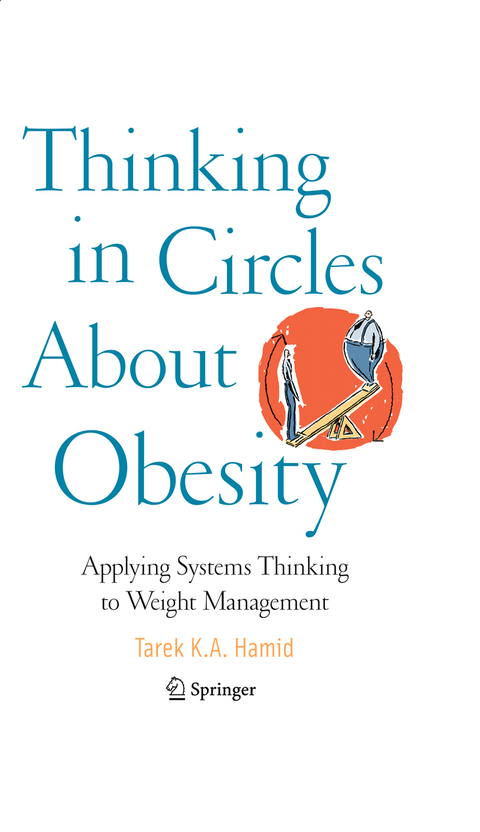Thinking in Circles About Obesity
Springer-Verlag New York Inc.
9780387094687 (ISBN)
Dr. Tarek K.A. Hamid is a trained system dynamicist (with a PhD from MIT, and a winner of the Forrester award for his first book). He has been a Professor of System Dynamics at the Naval Postgraduate School, in Monterey, CA since 1986, where he was awarded the Naval Postgraduate School's Faculty Performance Award, in recognition of meritorious faculty performance in both research and teaching. In the mid 1990s he became extremely interested in the confluence of information and medical technologies, and saw it as one of the most promising new frontiers for system dynamics research and public policy. But he had a lot for me to learn. So, in 1997, he took an open-ended leave-of-absence and enrolled in the Master's Program at Stanford's Engineering Economic Systems & OR Dept., where he focused on decision analysis and medical decision-making. (Returning to become a master student, while already holding a PhD was certainly a "weird" experience—for him, and for his professors—but it was a lot of fun.) It was during his studies at Stanford that he began to see the natural fit between the obesity problem (as a dynamic system of energy regulation) and system dynamics. (Research was revealing that human bioenergetics belongs to the class of multi-loop nonlinear feedback systems—the same class of system that system dynamics aims to study.) Upon graduation, he spent a year (1999-2000) as an affiliate at Stanford’s Medical Informatics Department (part of Stanford’s Medical School), where he worked on developing system dynamics models of human physiology and metabolism. In December 2001, he returned to his faculty position at the Naval Postgraduate School where he continues his research on medical decision making and modeling of human metabolism and energy regulation. When not teaching or writing, Tarek is usually on the water. With his wife,Nadia, won first place in the 1999 San Francisco to Santa Barbara Yacht Race (Cruise Division) on their traditional Alden 45 sloop.
Mismanaging the Obesity Threat.- Like Boiled Frogs.- How We Changed Our Environment, and Now Our Environment Is Changing Us.- Unbalanced Act.- Human–Environment Interactions: Not One Way … and Not One-Way.- Tilting the Energy Balance: More Energy In.- Tilting the Energy Balance: Less Energy Out.- Individual Differences.- Is Ad-Lib Behavior Killing Us?.- We Can’t Manage What We Don’t Understand.- The Energy Balance Equation: Reigning Intellectual Paradigm or Straitjacket?.- What We Know that Ain’t So.- Closing the Loops on Energy Balance: Energy Output Side.- Closing the Loops on Energy Balance: Energy Input Side.- Beyond Physiology: Closing the Behavior–Physiology Loop.- Looking Back and Looking Forward.- We Can’t Manage What We Mis-Predict.- Learning by Doing.- “Give Us the Tools, and We Will Finish the Job”.- A Microworld for Weight and Energy Regulation.- Experiment 1: Assessing Weight Loss—Reality Versus Fiction.- Experiment 2: Going Ballistic—On a Diet.- Experiment 3: Understanding Why 250 Pounds Does Not Equal 250 Pounds.- Experiment 4: Trading Treatment Options—Diet Versus Exercise.- PhDs for the Masses? (That’s Personal Health Decision support).- Prevention and Beyond.- The Fat Lady … Models.- The Third Path: Prevention.- Location, Location, Location: Places to Intervene in Systems.- It Will Take More Than Food Pyramids.- Microworlds ? Us.- Beyond Prevention.
| Zusatzinfo | 82 Illustrations, color; 66 Illustrations, black and white; XVIII, 468 p. 148 illus., 82 illus. in color. |
|---|---|
| Verlagsort | New York, NY |
| Sprache | englisch |
| Maße | 155 x 235 mm |
| Themenwelt | Geisteswissenschaften ► Psychologie ► Sozialpsychologie |
| Medizin / Pharmazie ► Gesundheitswesen | |
| Medizin / Pharmazie ► Medizinische Fachgebiete ► Psychiatrie / Psychotherapie | |
| Studium ► Querschnittsbereiche ► Prävention / Gesundheitsförderung | |
| ISBN-13 | 9780387094687 / 9780387094687 |
| Zustand | Neuware |
| Informationen gemäß Produktsicherheitsverordnung (GPSR) | |
| Haben Sie eine Frage zum Produkt? |
aus dem Bereich




